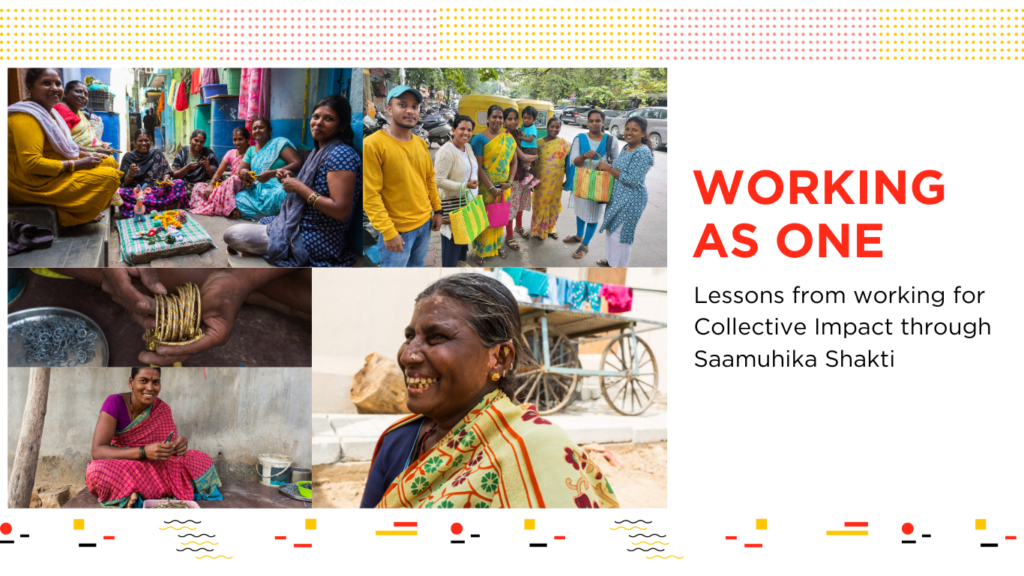With the second wave shutting down the markets across India, Udhyam Vyapaar reached out to various small businesses to understand how the lockdown has affected them. As a result of these surveys and conversations, we designed and initiated an emergency cash grant transfer program to support 500 small businesses across Bangalore. As the case for cash transfers as a viable and effective emergency relief program has become more popular during these last few years, Udhyam decided to also study the spending behaviour of these cash grants by the beneficiaries.
As the country was going through the harsh realities of the second wave, lockdowns and public restrictions became unavoidable. In Bangalore, the government had announced a lockdown on 7th May and it extended till 14th June. Small business owners were one of the heavily affected segments directly due to these restrictions as they depend on daily businesses for their sustenance. Moreover, these businesses were already heavily affected by the lockdown during the first wave and have been still struggling to recover and adapt to the new realities of Covid19 affected market conditions.
The Need
To understand more about the various challenges faced by small businesses during the lockdown, Udhyam decided to do a survey with around 200 vyapaaris initially. The survey was rolled out as the lockdowns were being initiated and the following insights came directly from it.
- Average monthly income dropped by around 65% from the previous month
- 21% of the vyapaaris has mentioned that they have no income from their business now
- 76% of the vyapaaris mentioned they have no savings to help them survive the lockdown
- 74% of the total vyapaaris also mentioned there is no other alternate income in their family than their business
- Govt and other support are inaccessible to them such that 98% of them mentioned receiving no support from the Govt during the previous lockdown
- 65% felt that emergency financial assistance as something that can help them survive this lockdow
Program Design
Understanding the current state of their businesses and the need for immediate support, Udhyam Vyapaar with the help of some of our partners quickly designed and implemented an emergency cash grant transfer program of Rs.5000 to reach about 500 small business owners in Bangalore. The eligible business owners were identified with the help of our field staff (Saathis) who had contacted these businesses directly and verified the need for assistance. They also collected and verified bank details and other information required to initiate the transfers. The majority of cash transfers were made between May 11 and May 27 2021, through direct bank transfers and UPIs
We were also interested to understand the spending behaviour of the small business owners on receiving an emergency relief grant and wanted to also check if messaging associated with these cash grants can have an impact on it. In order to understand it, we decided to split the 500 vyapaaris into three cohorts:
Control: The grant was transferred to them directly without any specific instruction
Naming the grant: The grant was given a name which made it evident that it is an emergency relief fund and it was made sure that the recipients were aware of the name.
Message with grant: When the grants were disbursed the Saathis had suggested to the recipients to consider spending or saving this on for any of their emergency needs.
The idea was to compare the spending behaviour between these three groups to see if there are any interesting differences. One major assumption we are making with this observation is that the effect of timing of receiving the grant within the selected period on the spending behaviour is negligible
Observations
A follow-up survey was done with around 380 recipients between June 25 and July 7, 2021, to understand the status of their businesses, challenges they have faced during wave 2 and to also check how they had used the emergency cash grant. Some of the observations that were made from the data collected from these surveys include:-
Status of Business
- 34% of business owners informed us that their businesses are still closed while 12% mentioned they are partially able to open now
- Of the businesses that are open, 41% of them mentioned that the status of their business as ‘very poor’ while 39% mentioned it as ‘worse than normal’
- The three big challenges they mentioned in order were – Customers are not coming out to their shops – They require Investments to improve their businesses – Customers don’t want their products now
- With service-based businesses like ironing, investment requirement was low but a higher concern was on the need for their services among the customers.
- Businesses like food, grocery, clothes, etc. investment is a bigger challenge as investments to buy new stocks or products are a major need.

Usage of Grant
- 98% of vyapaaris used the money
- 100% of them feel that they had used the money for an emergency
- Food security is the main area people spent money on(around 70% mentioned it). This had reduced slightly as we move from Cohort 1 to Cohort 3
- This was followed by everyday expenses (which include expenses like daily travel, milk, children’s needs, groceries, and other miscellaneous daily needs), which again reduced from Cohort 1 to 3
- Business expenses can be seen to increase to 26% as we move to Cohort 3
- Interesting aspects are rent and medical. This unexplainable difference may be a challenge to our initial assumption of spending behaviour not being largely affected by the time of grant received
- Another interesting observation on rent disparity is that when we separate by gender, this disparity doesn’t exist in females but in males only
- Future use, school fees, and Loan repayment:- very few people have mentioned they have used the grant for these. (less than 5% combined)
- When comparing between men and women usage, there can be seen a lesser percent usage in for ration and daily expenses among women but for business usage a higher percentage than men.

Challenges
- Interestingly, even though only 20-30% vyapaaris spend the money for rent, when asked about what are the main challenges they faced during the lockdown, around 65% vyapaaris mentioned rent which is much more than even ration (60%)
- When comparing between men and women, more men have mentioned (69%) about rent than women (60%)
- This increase in concern for rent could be because rent is a fixed future payment they are more directly aware of.
- Interestingly loan repayments also came up as a concern for about 24% when compared with the fact that only 2 % used the grant money for any loan repayment earlier
- As far as future challenges anticipated, school fees remain the main concern followed by poor business, medical issues, and future rent or other utility bills
- When enquired about how they are planning to meet these future challenges, half of them had mentioned that they have no idea currently how they can prepare for these challenges ahead
- Among the rest, the need for saving and informal loans seems to be the major options considered.
Conclusions
On business revival As can be expected, the continued disruption of the market through lockdown has a severe effect on the small businesses that have very little savings or any alternate sources of income to depend upon for their survival. Moreover, this sudden shock impact on many of these businesses doesn’t remain short term but can continue to persist unless they would be supported in reviving their businesses. These revival efforts could include:-
- Relief programs offer them easily accessible and affordable financial support. This financial support should not just cover business expenses but also take into consideration the other major challenges in their lives including food, rent, children’s school fees, etc.
- Moreover, with the uncertainty that still prevails, there is an increased awareness among small businesses on the need for building resilience. But there seems to be no specific clarity on how to achieve this. For these small businesses to be able to take risks and to have better confidence in the market now, it could be key for us to figure out how this resilience can be built so that they would be protected and be self-reliant in any future emergency.
- We should think about bringing more awareness and confidence among customers on the need to support these local small businesses and find ways which they engage with them safely even when future restrictions may emerge
On spending behaviour
Food security is one of the key targets of most of the emergency cash grant relief programs and in our cash grant also, it is evident that the main area of spending was on ration for their family. Only around 23 % of them had reported being able to invest it in their business. An important reason for this could be the general lack of clarity about the future of these businesses.
When comparing men and women, it is expected that women would spend more on household expenses than men. From our data, no such trend was able to be observed. But interestingly it showed higher spending on businesses by the women than the men. This further suggests the need for exploring the gender dynamics of spending behaviour through cash transfers and to consider women’s ability to earn and ownership of the business as an important factor while doing so.
The effect of messaging
Between Cohort 1 to Cohort 3, you can only observe very slight changes in the spending behaviour. Timing of the cash transfer may have a significant effect, especially when measuring it through a crisis like a lockdown. Also, each recipient understands or perceives emergency highly subjectively and this subjectivity might be missing in any gross direct consumption data.
Still, the program reiterates the importance of effective communication when implementing a cash transfer program not just to inform the beneficiaries on aspects like inclusion criteria, payment methods, etc. but also to understand their concerns and respond to it accordingly especially in emergency situations like this.


